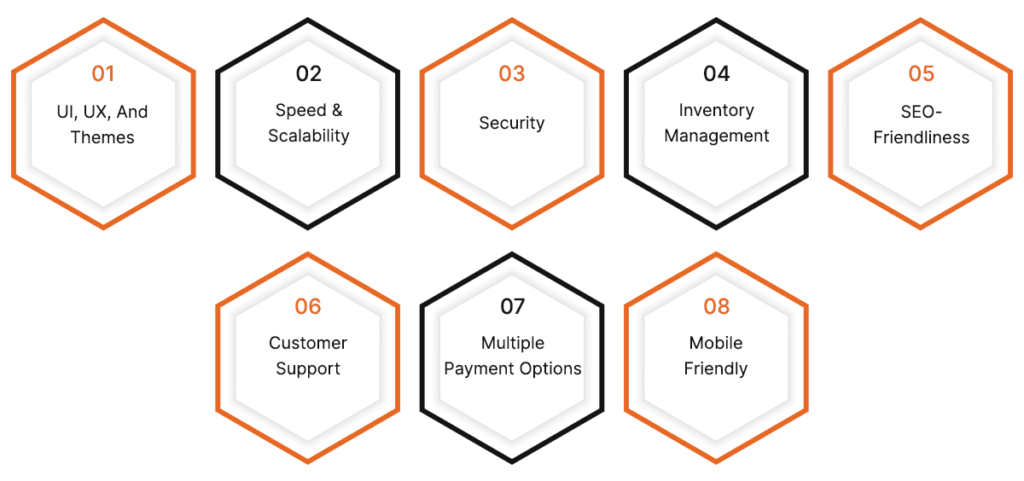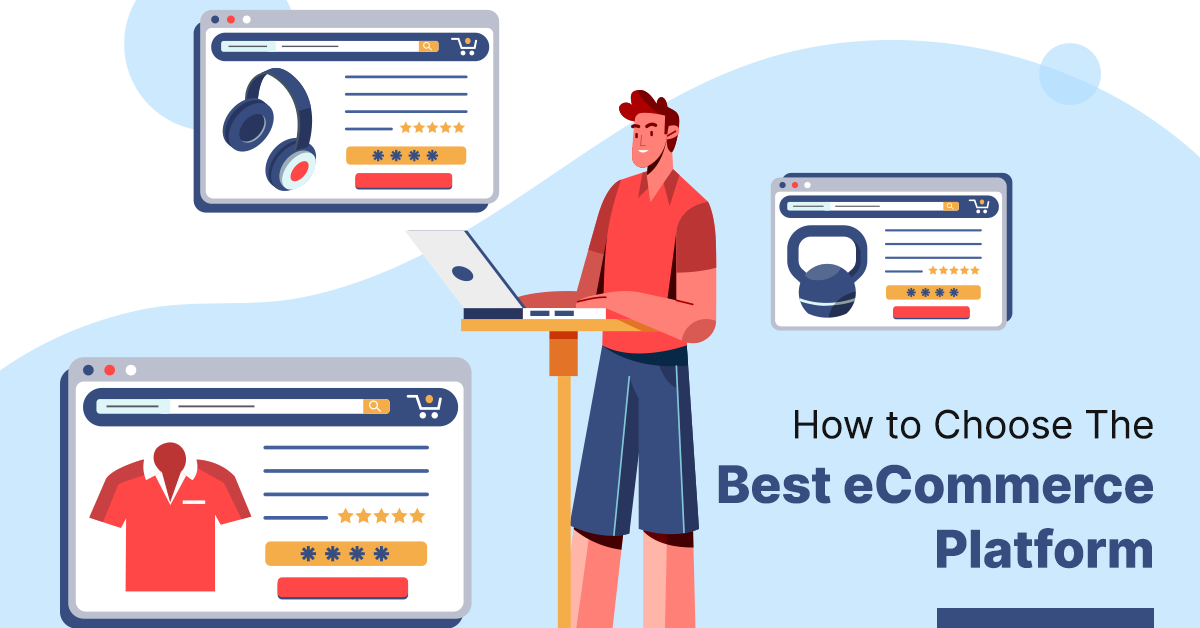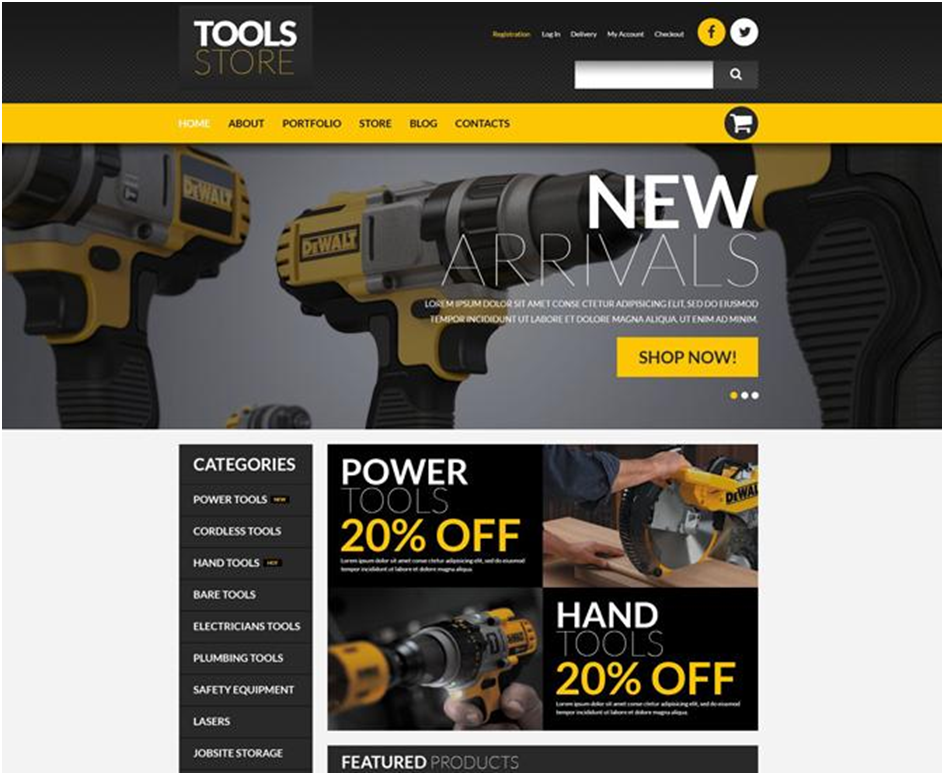Choosing an eCommerce platform is the most crucial step in launching an online store. An eCommerce platform plays a major role in deciding the fate of your online business. This digital environment determines how your eStore will look and behave. It impacts your online store’s scaling capacity, growth potential, running costs, and user engagement. Simply put, it contributes significantly to the success of your business. Therefore, sellers must weigh every aspect of different eCommerce platforms before opting for one.
In this guide, we will discuss the importance of an eCommerce platform, how it can affect your bottom line, and the factors that must be considered before choosing an eCommerce platform.
Why Selecting The Best eCommerce Platform Matters For Your Business?
First things first, eCommerce is growing massively and will continue to in the near future. As the number of buyers keeps increasing at an alarming rate, online store owners undergo the inevitable challenge of creating more intuitive and omnichannel shopping experiences. An eCommerce store is a critical part of that initiative. And, choosing a suitable platform is extremely important when you are trying to create a capable eStore.
It takes the load off your shoulders by facilitating the management of your website, orders, shipping, sales, and other critical operations effectively. Further, a scalable and robust platform drives customer satisfaction, opens up new expansion opportunities, and streamlines productivity as well as efficiency.
However, before you choose a platform, remember that your site’s performance will depend on the following things:
- Growth: Your goal is to grow and expand your business in the least time possible.
- Budget and costs: Along with eStore development costs include overhead costs such as software updates, web hosting fees, maintenance costs, etc., before setting your budget.
- Customer satisfaction: You must keep your customer satisfied before, during, and after the purchase.
- Goal achievement: Be it higher reach, sales, global expansion, social media engagement, or customer loyalty, goal achievement is the key.
What Are The Different Types Of eCommerce Platforms?
You can choose from three different types of eCommerce platforms to successfully launch your online store.
● Open-Source eCommerce Platform
An open-source eCommerce platform gives users complete control and access to the source code. This means users can make modifications and customizations per their business requirements and use a composable architecture to meet evolving needs.
Though these can be downloaded and used for free, you have to pay some fees and costs, including licensing, hosting provider, implementation, migration, and/or upgrades – depending on the platform you choose. Some of the most popular open-source platforms are:
- OpenCart
- PrestaShop
- WooCommerce
- Zen Cart
- Magento
- Drupal
● Cloud eCommerce Platform
It uses cloud-based technology and remote servers to help online businesses manage and scale their hosting, data processing and storage, payment processing, inventory management, and product information management needs. Some of the most popular cloud eCommerce platforms are:
- Magento Enterprise Cloud
- Demandware
- Salesforce Commerce
- Volusion
- Wix
- BigCommerce
● SaaS eCommerce Platform
SaaS (Software as a Service) eCommerce platforms are cloud-based solutions built, maintained, and hosted by third-party service providers.
Any online store owner who uses a SaaS platform doesn’t have to download or install software or supply web hosting. All they need is a good internet connection and a modern browser to effectively manage their online store via a portal. Some of the most popular SaaS eCommerce platforms are:
- Adobe Commerce
- Dynamics 365 Commerce
- Salesforce Commerce Cloud
- Shopify Plus
- Commercetools
● Build Your eCommerce Platform
All three types of platforms are unique and help eCommerce sellers deliver a seamless shopping experience to their customers. However, if your business has a definite set of requirements or belongs to a distinctive category, you can forego a platform and build a full-fledged eCommerce website.
This is best suited for businesses that need a customized solution tailored to their specific needs with absolute freedom over every aspect of their website. However, do note that building a website comes with its complications. You will need skilled developers, designers, and tools. Sellers can either choose to do it in-house, hire expert eCommerce freelancers, or outsource to a reputed vendor. Additionally, you will still have to integrate third-party tools and software for effective store functioning.
Top 8 Factors To Consider Before Choosing The Best eCommerce Platform
Imagine a situation where your target audience visits your store only to find slow-loading product pages, poor navigation, or a complicated checkout process. As a result, they will eventually abandon your store and move to your competitors’ websites. Ideally, an eCommerce platform should take care of such issues while allowing you to customize its features to fit your needs.
Therefore, building your online store on an appropriate platform is critical to ensuring a smooth customer experience and overall business gains. We have listed some significant factors that will help you crack the code to find the perfect eCommerce platform.
1) UI, UX, And Themes
Online stores rely on intuitive designs, user-friendly interfaces, and smooth customer journeys. In short, user interface (UI) and user design are the key factors that drive customer satisfaction and engagement.
Along with high-quality goods and services, customers want an interactive, easy and immersive shopping experience. If you are selling exceptional quality products but present them in a vague manner or format, customers might simply abandon the purchase without even looking at the products. Therefore, the platform you choose must allow you to facilitate excellent user experiences via attractive design formats, easy navigation, fast loading speed, and other visual elements. In addition to this, make sure it provides multiple theme options to create a robust, feature-rich online store.
Remember, a well-designed store not only attracts customers but persuades them to buy from you. Resultantly, you can witness a rise in conversion rates, customer satisfaction levels, and revenue.
2) Speed & Scalability
To survive in the highly competitive eCommerce landscape and fast-paced conditions, your store must deliver a lightning-fast experience throughout the customer journey. Whether you are selling a single product category or multiple categories, your store performance must be consistent. Therefore, choose a platform that offers a set of unique features and functionalities to fulfill growing business needs.
But how do you evaluate the platform’s speed and scalability? Well, there’s no direct way to measure the platform’s performance, however, you can check some features, such as:
- Advanced caching
- Auto purge content
- Mobile responsiveness
- CDN (content delivery network)
- Speed optimization and monitoring tools.
Look for a solution that can quickly resolve performance issues such as 404 errors, slow page loading speed, frozen pages, and other similar errors.
Another vital aspect of platform assessment is scrutinizing its ability to handle enormous traffic. A platform that fails to perform at peak traffic hours is detrimental to your business’s reputation. Therefore, look for a scalable solution that can fulfill changing requirements.
3) Security
The digital era is prone to fraudulent activities and security breaches. When it comes to online selling, consumer privacy is of utmost importance. Any violation can lead to huge losses – in terms of brand reputation, customer trust, credibility, and revenue.
The platform you choose must provide state-of-the-art security against all kinds of frauds and thefts. As a store owner, you will be responsible for tons of sensitive customer data, including payment details, addresses, contact numbers, and other details. A well-maintained, robust platform will ensure strict adherence to and provide access to built-in features for DDoS attacks and fraud protection. Additionally, the platform must be Payment Card Industry (PCI) compliant, wherein credit card holders’ information will be safe and secure.
4) Inventory Management
Regardless of business scale and type, keeping track of your orders and inventory is critical to improving cash flow, optimizing fulfillment, avoiding spoilage and dead stock, and saving on storage costs.
Unfortunately, several online businesses fail at inventory management either due to an inefficient platform, a shortage of tools, or a lack of knowledge. While the latter can be resolved with adequate learning, the first two depend on the platform you establish your eCommerce store on.
The platform must have a set of inventory management tools so that you can track and manage your inventory at the right time. Additionally, it must allow you to easily overcome the challenges of inventory management such as changing demand, supply chain issues, difficult counting processes, or disorganized stock rooms.
5) SEO-Friendliness
To gain higher rankings in the SERPs and maximize your visibility, it is important to optimize your eCommerce store for search engines. If you choose a platform that offers integrated SEO practices and tools, it will become easier to implement organic search engine optimization strategies. Plus, you won’t have to worry about common Technical SEO issues.
Some of the significant SEO features to look for in the eCommerce platform include:
- Canonical Website URLs
- Indexing Control
- Meta Data
- Mobile Optimization
- Unrestricted Product Descriptions
- Taxonomy Options
- Page Control
- Customizable HTML <HEAD> Sections
- Pagination
In addition to this, make sure the platform updates its functionalities and features with Google’s changing algorithms.
6) Customer Support
24*7 accessibility is one of the top advantages of online shopping. Customers all across the world can purchase the desired products and avail of all kinds of services any time of the day or night. This means 24*7 customer assistance and support. Therefore, you must have a robust support system to handle customer queries and promptly provide them with apt solutions, regardless of the time.
Platforms like Shopify, PrestaShop, or Magento help store owners leverage advanced software and tools for live chat and dedicated customer support across multiple channels. You can analyze your customer base and accordingly choose a platform that provides cost-effective yet responsive support tools.
7) Multiple Payment Options
Customers always prefer a store that offers multiple payment options such as debit/credit cards, cash on delivery, bank transfers, or e-wallets. This increases the chances of a successful checkout process and ultimately enhances customer satisfaction and sales.
Unfortunately, not all eCommerce platforms provide support for or are adaptable to every payment gateway. This can lead to a higher cart abandonment rate as customers won’t be able to pay in their preferred way. Therefore, before you choose a solution, make sure it is compatible with the popular payment gateways.
8) Mobile Friendly
A significant percentage of the customers use their mobile phones to browse through online stores and place orders as it seems more convenient. According to Insider Intelligence, m-commerce will reach $620.97 billion in 2024. Therefore, as an online seller, you must optimize your store for mobile to stay competitive – especially after the pandemic.
To reach your target audience and facilitate a hassle-free shopping experience, you must optimize your e-store for mobile. Fortunately, a feature-packed eCommerce platform can help you achieve a fully-optimized mobile website.
Before choosing one, check whether it offers diverse functionalities, like the following:
- Responsive and attractive design
- User-friendly navigation
- Clickable text
- Drop-down menus
- Fast load times
- Intuitive checkout process
- Optimized images and videos
- A/B testing
Additional Factors To Select The Right eCommerce Platform
To help you make an informed decision, here are some additional factors to consider before choosing an eCommerce platform:
- Personalization
- Ease of Use
- Price and budget
- Maintenance costs
- Social media integration
- Bandwidth
- Web hosting
- eCommerce analytics
- Third-party integrations
So, Which Is The Best eCommerce Platform?
There’s no way to answer that because the utility of any eCommerce platform will depend on your needs. Instead, any platform that delivers your desired outcomes and meets your business goals can be termed “the best eCommerce platform” for you.
So, before you select an eCommerce store, make sure you have identified your requirements, planned your budget, and analyzed other critical resources. Also, the platform you choose shouldn’t just meet your current needs but future requirements as well – as and when you scale up. An eCommerce platform that helps you create a robust store, connect better with your audience, and puts you at the forefront of the market will be the right choice for you.
Author bio: Mike Wilsonn is a professional content strategist and writer working at SunTec India. He has over 5 years of experience creating compelling content on a multitude of topics like technology, travel, digital publishing, data management, and others. He pays special attention to eCommerce and Amazon SEO Services to help sellers successfully navigate the ever-changing eCommerce landscape.





